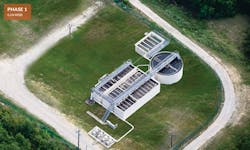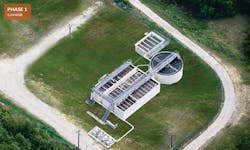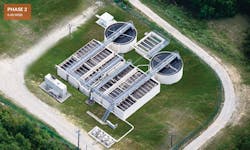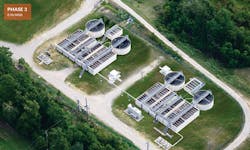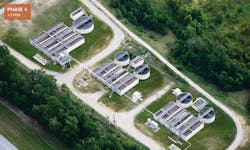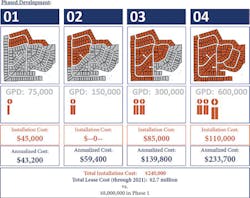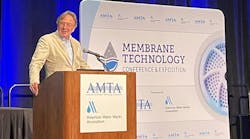By Todd Mueller
As our nation continues to grow, so does our need for wastewater treatment capacity. According to the ASCE’s 2017 Infrastructure Report Card, there are 14,748 wastewater treatment plants in the U.S. and by 2032, more than 56 million new users will be connected to centralized wastewater treatment systems. The investment gap for drinking water and wastewater infrastructure between 2016 and 2025 is estimated to be around $105 billion. Additionally, water services receive less than 5 percent of the federal government funds when compared to the other major infrastructure categories. With the limited amount of federal funding in the wastewater industry, it is critical to have alternative financing options to install, upgrade and repair wastewater facilities. After all, wastewater treatment is critical to protect public health.
Modular Design
Traditionally, large wastewater treatment plants were the only option available to municipalities when faced with a need for wastewater treatment. This limitation forced city governments to commit to a high upfront capital contribution and, more often than not, a wastewater treatment plant that would only use a small percentage of its total capacity until many years down the road.
To address this issue, AUC developed a modular, expandable plant design to provide treatment of current wastewater flows and allow customers an economical solution that covers their existing wastewater needs. Once in place, these systems are readily expandable as development continues and wastewater flows increase.
Finance Options
More recently, the option to lease has become available as an alternative solution to save significant front-end capital. With limited federal funding for utilities, municipalities needed a way to greatly reduce upfront costs. Having the option to lease allows the utility district the chance to build smarter by removing the heavy burden of a large initial investment. Further, municipalities can redirect capital to other infrastructure projects to continue to maintain overall development in the community. Paired with the modular design concept, this allows municipalities total flexibility to plan “on demand” by spending and adding capacity as a community grows.
A good example is Municipal Utility District 418 in Harris County, Texas. The district was faced with a need to treat wastewater generated by an 11,400-acre planned community. The lowest bid came in at $8 million. With an annual operating budget of $950,000, the district needed to find an alternate solution.
The district’s consulting engineer asked AUC Group L.P. (Houston, Texas) if there were other ways to expand treatment capacity. After reviewing the project needs, AUC Group recommended the utility district lease a temporary facility and phase construction to adjust capital expenditures based on capacity demands. In the end, the five-year lease will cost $234,000 a year for a total investment of less than $2 million.
After the five-year term, the lessee has several options: continue to lease, exercise a purchase option or construct an ultimate treatment solution and terminate the lease.
Benefits of Leasing
Wastewater financing options can include short- and long-term lease arrangements, lease with a purchase option and installment sale programs, depending on what works best for your organization. Some additional benefits of leasing include:
- Lower Capital Expenditure: The biggest advantage of leasing is that capital or payments related to leasing are spread out over several years, hence saving the burden of a one-time significant capital investment.
- Better Use of Capital: Leasing allows municipalities and developers the option to fund other infrastructure projects and/or save money for a better capital investment decision.
- Termination Rights: At the end of a leasing period, the lessee holds the right to buy the plant and terminate the leasing contract.
Until the importance and true cost of wastewater treatment are realized by our nation’s capital, the funding gap will continue to exist. Having the option to be “on demand” with funding and project capacities is a great alternative for wastewater treatment plant providers, both large and small.
Determining whether leasing is right for you depends on your current circumstances. A few questions to consider include: How much do you want to spend? How healthy is your cash flow? How long do you need the equipment? What impact will the lease have on your taxes? Why build a permanent wastewater treatment plant that will need to be replaced in order to add capacity in the future? Why pay for more capacity than is needed at the start of a development? Once you’ve answered those questions, you’ll be able to determine if leasing is the best option for your business.
About the Author: Todd Mueller is president of AUC Group L.P. He has over 25 years of experience in the wastewater treatment industry. He began with TEC Industries and was later named Vice President of Wastewater Construction with AquaSource Utility Construction. Today, he leads a team of professional employees committed to operational excellence at AUC Group, a leading provider of wastewater treatment solutions for over 45 years.
